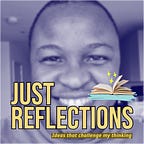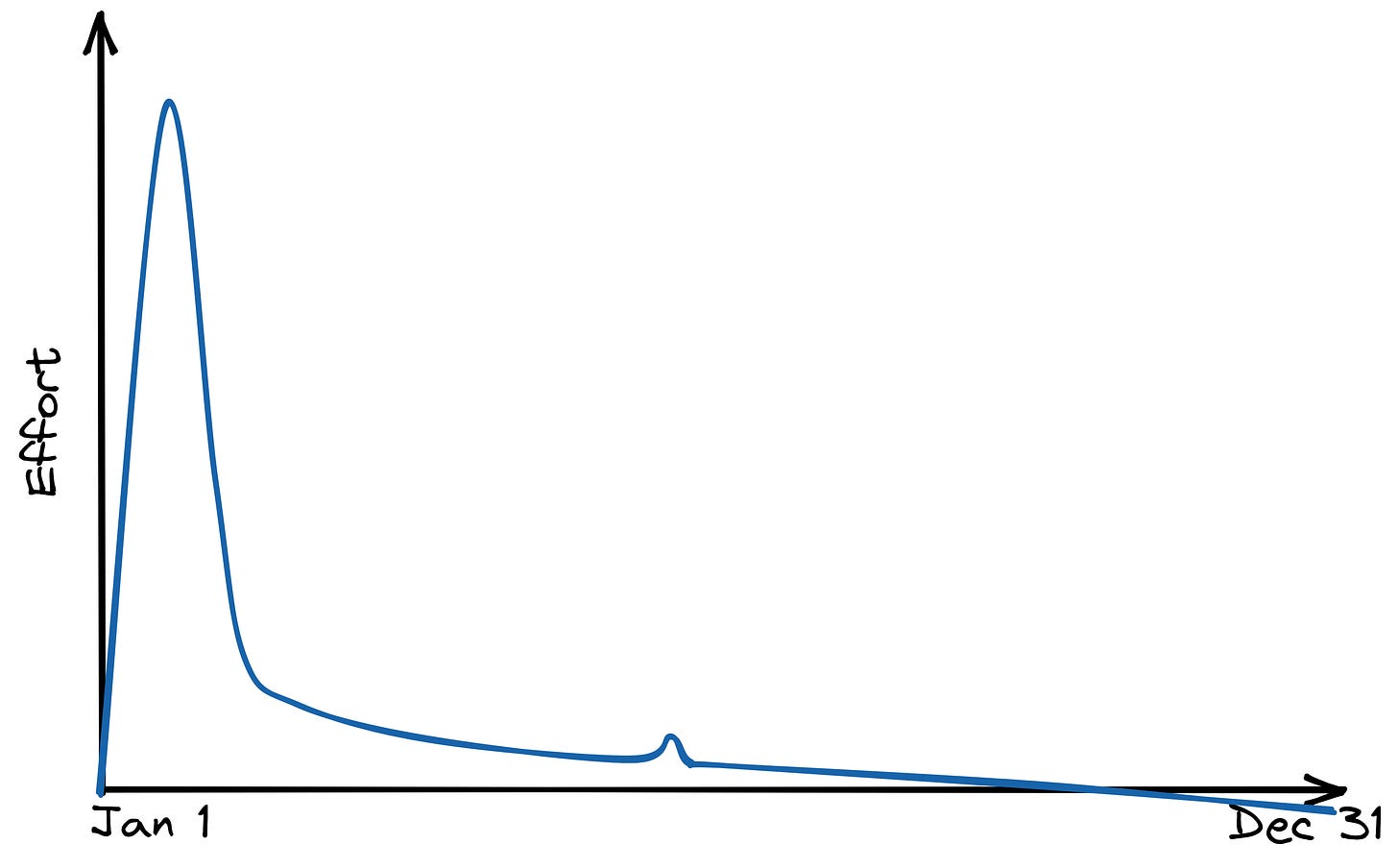It’s July, which means it’s the middle of the year, which means it’s time to review how the year is going. Be warned, this is going to sound like an excuse for not meeting my goals, but stay with me, there’s a good point to it.
Give yourself a theme
Did you set any new year’s resolutions this year? How’s that going? If I had to bet on the status of your resolutions, I’d say they’re probably not flourishing. They might even be failed or foregone by now. If this is you, don’t worry. I’m not judging and you’re not alone. I also set some resolutions at the start of the year that I’ve fallen short of.
Here’s how the effort curve for new year’s resolutions usually looks:
I’ll also take a leap and guess that this isn’t your first time trying out new year’s resolutions. You’ve been here before; go vegetarian, quit smoking, exercise more, read more, quit Twitter, etc. You’ve made resolutions with concrete conviction, fallen right off in short order in March, only to return next year to choose another resolution. Or the same one. Resolving, retreating, returning year after year after year of your unchanging life.
Maybe you’re one of the more disciplined among us. You resolved to lose 10 kilos by the end of the year and actually did. But then next year, when the resolution was about reading more, you gained all the weight back. You’re left chasing the same outcome again because you only treated the symptoms without addressing the cause.
Whichever one of these sides you fall on, New year’s resolutions can be a stark reminder that human behaviour change is really hard. So maybe this resolution stuff isn’t the way to change. Maybe there’s a better route to positive life change. Well—as you may have expected—I have some ideas. Allow me to suggest a gentler approach. Give yourself “A Theme.”
“Achieving a goal only changes your life for the moment. That's the counterintuitive thing about improvement. We think we need to change our results, but the results are not the problem. What we really need to change are the systems that cause those results. When you solve problems at the results level, you only solve them temporarily. In order to improve for good, you need to solve problems at the systems level. Fix the inputs and the outputs will fix themselves.” — James Clear, “Atomic Habits: Tiny Changes, Remarkable Results.”
Focus on the trend
Instead of setting yourself up to fail by saying, “I’m going to lose X kilograms by next year,” or “I’m going to read at least one book per month.” A theme would be something like, this is the “Year of Reading” or “Year of Health.” If that sounds too broad to you, that’s the point! For some things, precision matters and for others, it doesn’t. We’ve already established that human behaviour change is hard. So when building yourself into a better version of yourself, exact data points don’t matter as much as the overall trend line. If the trend is going in the right direction, so are you!
In fact, just moving a trend line from one direction to another is hard enough without defining arbitrary goals that will make you feel like a failure when you fall short of them.
Even just decelerating a negative trend is positive.
Your theme
Is there something you want more of? Well, life is a branching path, and it’s the trend of your decisions that will get you there. Some will be big decisions, but most will be small. They will all accumulate towards your goal.
Stuck in a long queue and you’re bored? If it’s the “Year of Reading,” then open a book instead of Instagram or whatever else. That’s it, that’s all it takes. You were at a branch and you went toward your theme instead of the other direction.
Having a theme is like having a shortcut for decision-making. When you notice branches, you will have a system for considering the choices. Reminding you to be a little different, even in seemingly insignificant moments. If this year is the “Year of Courage” for you, instead of saying I will do 12 courageous things this year (one for each month). Say, “When I have to choose between two things, I will always choose the more courageous one, no matter how small.” The result will be that your year will be more courageous than normal.
In picking a theme, choose something that is nice and broad for the general direction you want to navigate your life. Think words like Novelty, Fun, Health, Family, Finances, etc. The term “navigate your life” is important here. The diverging paths of life are hidden ahead in the future. You can’t plan the whole route because there’s no certainty about the future. Many unseen obstacles await and at any moment, you are where you are now and can only navigate from here with the information you have right now. Perhaps you started a “Year of Completion” focused on finishing all the projects you started in the past. Then you realise they’re no longer relevant to the alternative career path you’ve chosen. You haven’t failed. It’s still the “Year of Completion.” The broadness of a theme allows its meaning to change as you change. You started out wanting to read more books, but then you found out that reading-reading doesn’t work for you and listening-reading to audiobooks is where it’s at. You’re still on theme! Here are some words you can use in choosing your theme:
The details of what they mean to anyone else don’t matter. What matters is whether there’s something about it that strikes you or calls out to you. Take the one that resonates with you and run with it.
A broad theme allows its meaning to change with you without the guilt of having failed to achieve the goal of a past you who doesn’t exist anymore. Just having a theme will make you aware of paths you otherwise wouldn’t have paid attention to, which will change you. It’s like when you plan to buy a certain model of a car, suddenly you’ll start seeing that car everywhere. It’s not that there are suddenly more Range rovers on the road, you’re just noticing them more. Your theme should get you thinking about your thinking and thinking about your thinking changes your thinking, which changes who you are.
If this feels very hippy-dippy, lovey-dovey, huggy-wuggy, fuzzy-wuzzy, that’s fine. Not all tools need sharp edges. You should always work to build the life you want to live and themes are a fuzzy, high-level, long-term way to navigate your life towards a broad area of change. Based on your theme, you may set up smaller and more specific systems which will guide your actions towards the goals of the theme.
My “Year of Health,”
With all that being said, I’m changing my resolutions for this year to themes. July was my deadline for being 70 kilograms. Today is July 3rd and I’m 76.9 kilograms. I failed, but that’s fine because this is still the “Year of Health” with a focus on lowering my weight. So while my weight is not where I want it to be, I’ve made some big strides in taking control of my health sustainably. Here are some wins that I can register today.
Before this year, I would eat upward of 2000 calories per day on an average day. Now, maybe your job involves digging holes all day and 2000 calories is nothing to you, but I’m a software engineer and my job involves sitting at a desk all day and moving my fingers. That, unsurprisingly, burns very few calories. It’s worse because I work from home 100% of the time, my commute is barely 10 metres from my bed to the next room and on some days I work from the bed. All this meant that on an average day I was accumulating a calorie excess. So it’s no wonder my weight was out of control. These days I eat about 1500 calories on average, so even with no additional movement, that’s 500 calories off my intake every day. I’d say that’s a trend in the right direction.
At some point, I took up running on the treadmill three times a week. That was an enormous struggle. Not for the reasons you’d expect. I find running incredibly boring. My runs were only 20mins per session, but even in that short time I would get so bored that running was more of a mental exercise than a physical one. I wouldn’t struggle with the running, but that monotonous repetitive movement felt like watching paint dry. I tried all the tricks, listening to music, to books, to podcasts, running in silence, but nothing helped. So it was hard to stay consistent. Fortunately, I found a new hobby that’s good exercise and also fun; inline skating or rollerblading for you cool kids out there. This means I get to burn calories while enjoying what I’m doing. I’m still new to it and I’m still learning, so I’ve fallen many times. I also can’t wander off too much because I’m not yet confident that I won’t bump into people or cars. But I’m working on it and I’m getting better every day. Soon I’ll be able to put in some real cardio on skates. This means I can burn off some calories while also having a great time. I’ve also made some skating friends.
Anyone who knows me knows I drank a lot of juice. I drank unwieldy amounts. Much more than I should and certainly more than what a guy who moves as little as I do should be drinking. An unintended result of this is that my palate was so used to drinks being sweet that water tasted horrible to me. Despite this—and based on the advice of self-help YouTubers—I forced myself to keep a bottle of water on my desk. I don’t know what it is but if there’s a bottle of water right there you’ll end up drinking it. Just out of boredom, I guess. So if boredom makes me want to put things in my mouth, I may as well make sure it’s good things I’ll put in my mouth. This got me used to the taste of water. Now it’s fine and I refill my bottle often. To compound this, somewhere along the way, something convinced me it really makes little sense to keep chugging down sugar water for someone with as sedentary a lifestyle as mine. So I just drink water most of the time now and as much as possible, I don’t even keep the sweet drinks stocked in the house anymore.
I believe it was a combination of these factors that allowed me to drop my weight from 85.6 kilograms on the 4th of January to 76.9 today. This is 6.9kg short of where I wanted to be, but it’s 8.7 kilograms less than where I started and I’m really proud of how far I’ve come. I’m also happy that I’ve achieved this through minor lifestyle changes that aren’t too restrictive or gruesome, so I’m confident that I can sustain them long-term.
However, it seems like with what I’m currently doing +/- 77kg is the furthest I’ll drop because I’ve been here for a while, so if I want to drop some more kilos, I’ll need to do more. But it’s the “Year of Health,” and there are many more healthy choices I can still make.
This is where I am and my advice is wherever you are, whatever the state of your resolutions, give yourself time to find a theme that resonates with you and try it out.
— This article heavily derives from CGP Grey’s ideas on creating a theme for yourself and James Clear’s “Atomic Habits: Tiny Changes, Remarkable Results.”















